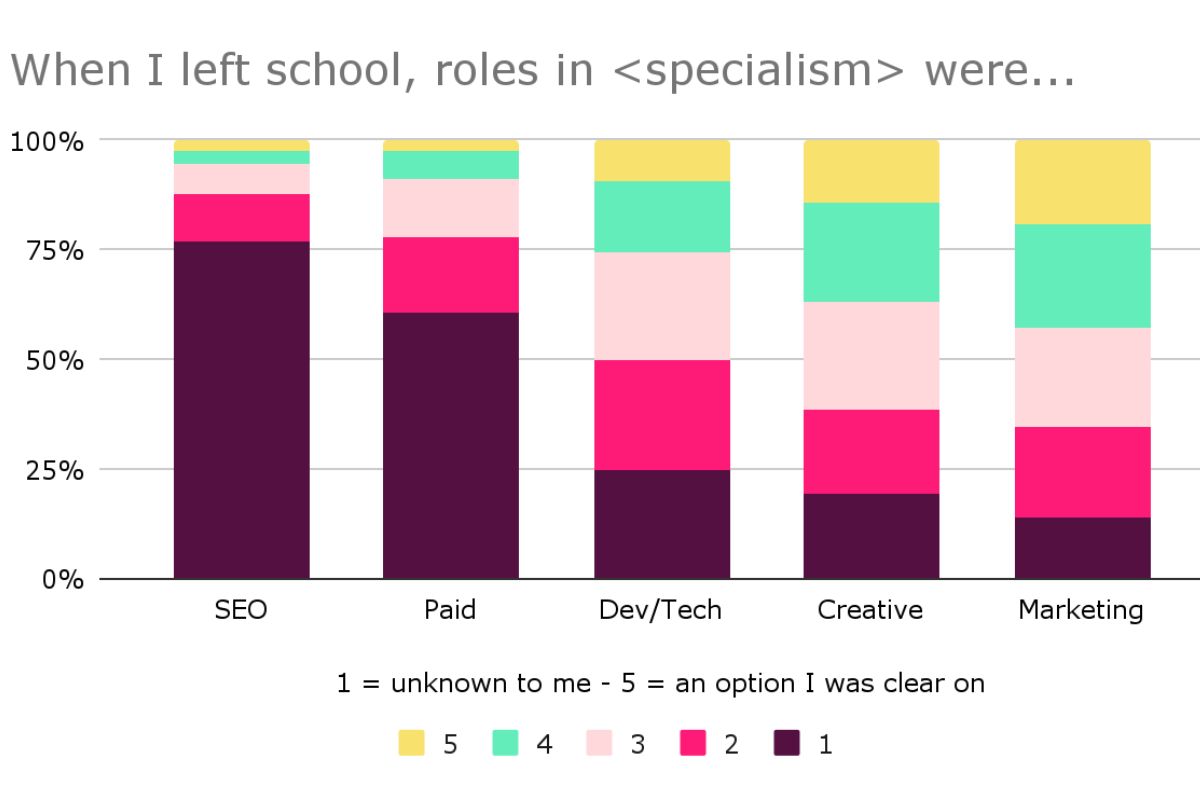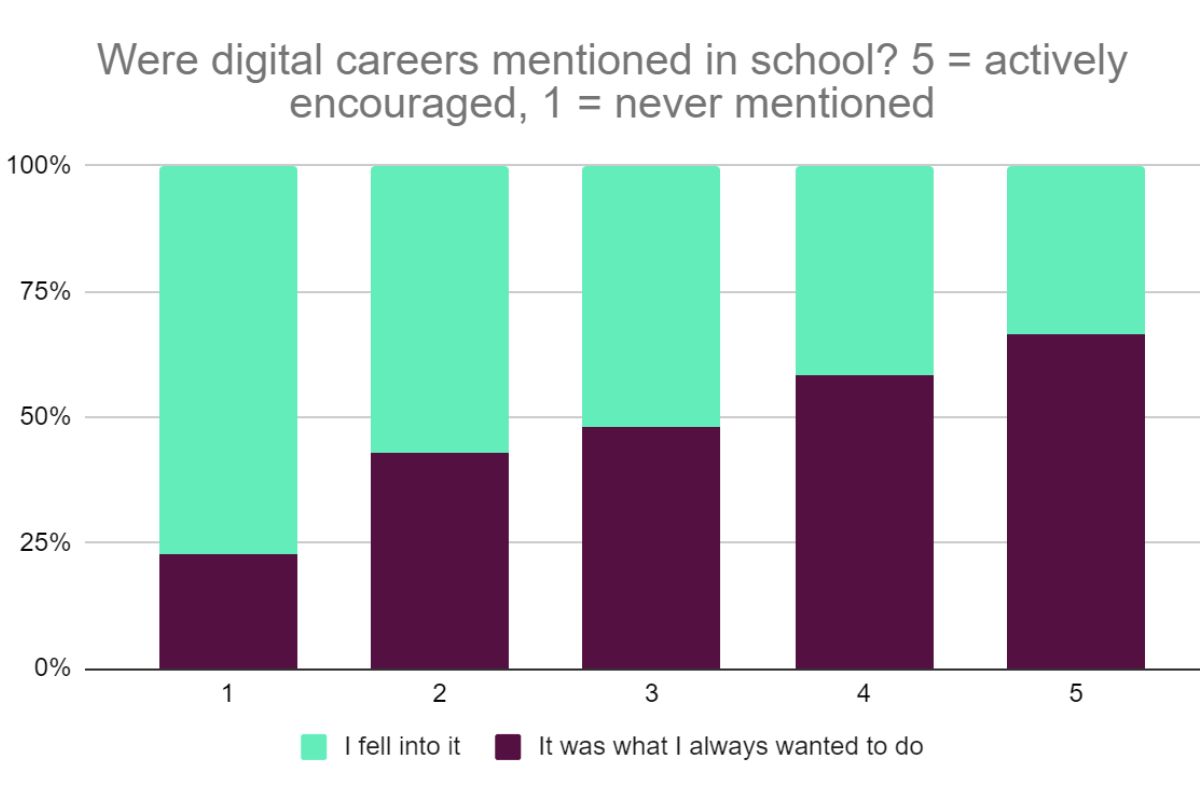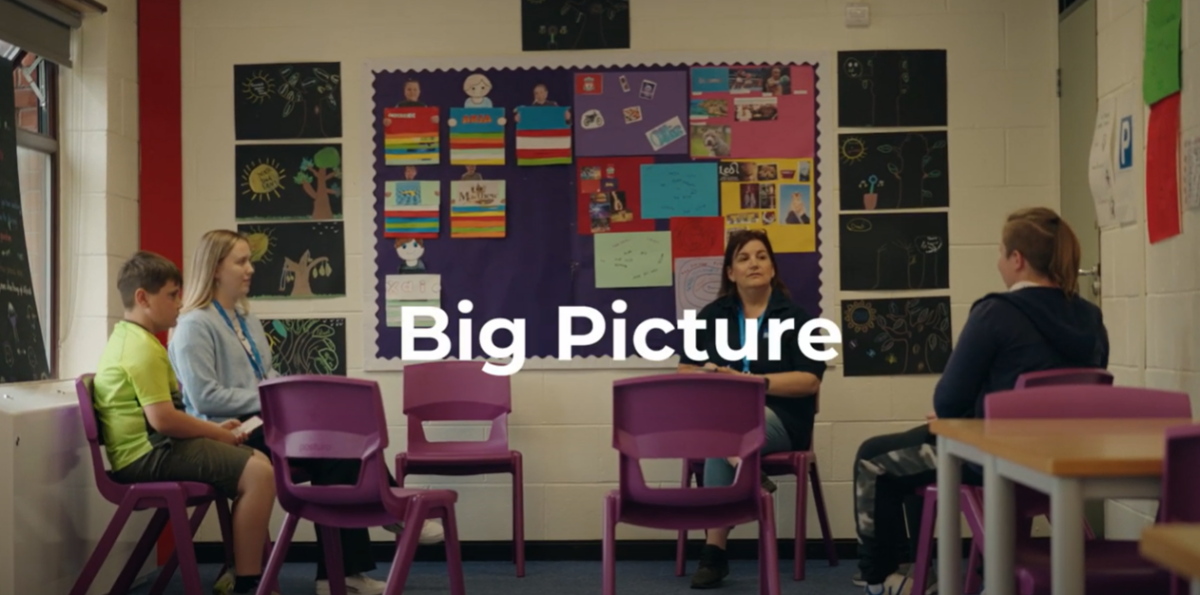60% of Young Adults ‘Stumble’ into Digital Careers, finds new report

Becky Simms, CEO of Aspiration Digital, is now calling for stronger collaborations with educational institutions, industry leaders, and policymakers to ensure that digital careers are actively promoted and understood.
- A new report has found that 60% of 18-25-year-olds still find themselves in digital roles by chance rather than by design. Additionally, 67% of that same age group cited that digital careers were never mentioned at school.
- The findings are part of a comprehensive study conducted by Aspiration Digital, a leading one-day conference dedicated to inspiring the next generation of digital leaders, to gain an understanding of what inspires and drives young people into the digital industry.
- The data also found that a huge 83% of people who work in digital believe the digital skills gap is a problem for the industry.
A startling new report has found that three in five 18-25-year-olds still find themselves in digital roles by chance rather than design.
The finding is part of a comprehensive study conducted by Aspiration Digital, a leading one-day conference dedicated to inspiring the next generation of digital leaders, with the hope of gaining an understanding of what inspires and drives young people into the digital industry.
The data also found that 67% of 18-25-year-olds cited that digital careers were never mentioned at school and a huge 71% of people in the digital industry have ‘fallen into’ their careers.
While existing data highlights a digital skills gap – with 82% of today’s jobs requiring digital skills – the results revealed a significant inspiration gap, reinforcing Aspirations Digital’s ambition to change this narrative.
Key Findings:
Accidental Careers: While fewer young people are falling into digital careers compared to older generations, 60% of 18-25-year-olds still find themselves in digital roles by chance rather than design
Marketing and Creative are better encouraged, but core digital services are suffering: Core digital skills, such as Search Engine Optimisation (SEO) and Digital Paid Media, are badly underrepresented within schools, with the highest rates of those specialisms never mentioned in career conversations. This is leading to a skills shortage within the industry.
The digital sector is consistently at a high rate of change, meaning even those in the industry must continue their professional development to stay on top of new challenges and opportunities, such as the cookieless future, AI and cybersecurity. Now more than ever, the industry needs fresh eyes and enthusiasm to deal with these challenges.

Awareness Matters: Those who actively pursued a digital career were more likely to have undertaken a marketing or business-specific degree. This benefits digital companies, educational providers, and clients as newcomers enter the industry with higher motivation and better-equipped skills.
Curriculum Skills Gap: 67% of 18-25-year-olds cited that digital careers were never mentioned at school. Many young professionals report having to teach themselves essential skills within their roles, indicating a gap between academic preparation and industry needs.

A Lack of Awareness: The Root of the Problem
Becky Simms, CEO of Aspiration Digital said: “Our journey to uncover the ‘Digital Inspiration Gap’ has highlighted a critical issue: the lack of awareness and encouragement in schools obstructs students from exploring diverse career opportunities within the digital sector.
“If students do not know about careers within the digital sector, how can they aspire to work in one?
“In workshops across various schools, when asked ‘What does a career in digital mean to you,’ the most common answers are coding or social media influencers.
“While these are valid careers, there are countless other roles students are unaware of. This limited understanding must change for the good of our industry, as there are many amazing career opportunities that students need to see and choose as career goals.”
Looking Forward
Becky adds: “In 2018, Aspiration Digital was founded as a one-day conference aimed at inspiring the next generation of digital leaders.
“Across five successful events, we have impacted over 1,200 students, introducing them to a multitude of pathways, roles, and careers within the digital sector.
“As we gear up for our 2025 event at Bluewater Showcase Cinema, we are more committed than ever to addressing this gap, and expanding Aspiration Digital across the UK.
“By fostering strong collaborations and providing practical experiences, we can inspire and empower the next generation of digital leaders.
“As Confucius wisely said, “Choose a job you love, and you will never have to work a day in your life.” Let’s continue to inspire, educate, and empower the future digital workforce.”
As Aspiration Digital continues its mission, the organisation calls for stronger collaborations with educational institutions, industry leaders, and policymakers to ensure that digital careers are actively promoted and understood.
Nicola Drury, Head of Skills and Apprenticeships at Amazon, said: “At Amazon, we engage with thousands of students aged 5-18, providing them and their teachers with the necessary skills, materials, and exposure to different career pathways.
“The pace of change in careers today is unprecedented, making it challenging for young people to know what they want to do at 16 and still have that be a viable career by the time they’re 18.
“That’s why equipping them with transferable, durable skills is so crucial – not just for those entering the workforce, but for those already in work who need to adapt to constant change.
“We need to work closely with educators to ensure our curriculum and offerings stay up-to-date and relevant, empowering students to make informed decisions about their future.”
Phil Smith, Chair of the Digital Skills Council, said: “I think if you asked the average person on the street what they thought digital careers and jobs were like, you would get a huge variety of responses from “IT nerd”, to “bedroom coder/ hacker” to “really boring” but rarely would you get a consistent and attractive view of the careers, earnings possibilities and number of interesting industries you can work in with digital skills.
“I think we need to make it real for young people.
“They need to crack the hard shell of companies and show them what a digital job involves. It can be a creative, problem-solving, collaborative, exciting and lucrative career.”
Victoria Young, Senior Manager at People Business Partner, UK, said: “A common narrative today is that we no longer have ‘careers for life’ and the sense is that is not desirable now or would be monotonous, which likely makes students less driven to focus on a specialism. But is this an unhelpful narrative?
“The report highlights the rate of change in the industry and the number of specialisms and vast role types, therefore working in ‘Digital’ for life could lead to a very diverse career path and that would make this ‘career for life’ very exciting if students were motivated to actively choose it.”










